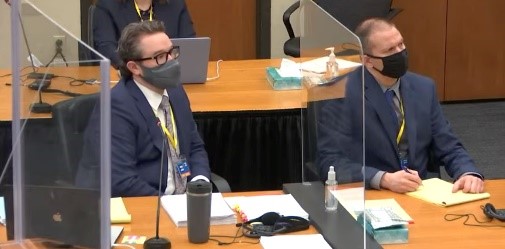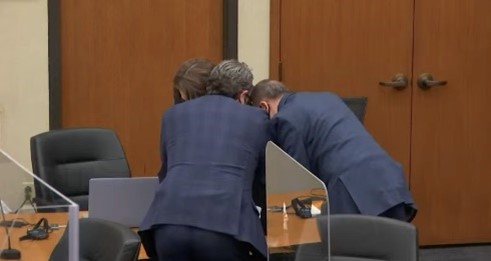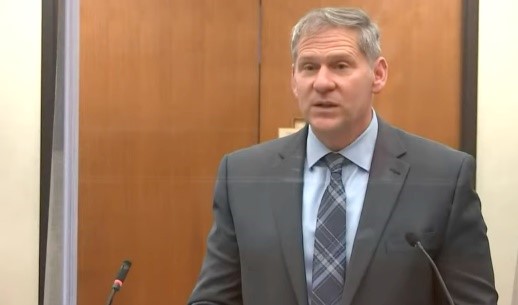

By Dorrin Akbari and Koda Slingluff
MINNEAPOLIS, MN – Judge Peter Cahill reinstated the third-degree murder charge here against Derek Chauvin in the death of George Floyd, and the number of seated jurors rose to six as one additional juror was selected on Thursday—three jurors are white, three are people of color.
The prosecution is back to the three charges that they wanted to use in Derek Chauvin’s trial, and it happened just in time, thanks to the Minnesota Court of Appeals’ decision. Chauvin is now charged with second-degree murder, third-degree murder, and second-degree manslaughter.
In October, Judge Cahill dismissed the third-degree murder charge against Chauvin on grounds that it only applies when the act committed by the defendant threatens the lives of more than one  person.
person.
Later that month, Cahill rejected a prosecution motion to reinstate the third-degree murder charge after the Minnesota Court of Appeals upheld the same charge in the case of former Minneapolis police officer Mohamed Noor on Feb. 1.
Despite the Court of Appeals ruling that third-degree murder can indeed apply when only one person was threatened, Judge Cahill contended that the appellate decision wasn’t precedential until the Minnesota Supreme Court either denied review or reviewed and upheld the decision.
On March 5, the Minnesota Court of Appeals said that Judge Cahill must reconsider his decision to exclude the third-degree murder charge. The court ruled that the precedent set in its Feb. 1 decision regarding Noor was binding authority when it was filed—meaning that Cahill was obligated to abide by it.
The court noted, however, that Cahill could still hear other arguments against the charge before making a final decision.

Defense attorney Eric Nelson formally asked the Minnesota Supreme Court on Monday to review and overturn the appellate ruling. His request was denied on Wednesday, the second day of jury selection.
As soon as court resumed on Thursday morning, Judge Cahill addressed the ongoing issue of reinstating the third-degree murder charge against Chauvin. The judge allowed Nelson to present his case. Nelson argued that Chauvin’s case was “factually and procedurally” different from that of Mohamed Noor.
As to the facts, Nelson contended that Noor shooting his gun across his partner’s chest endangered more than one person, meaning it met the multiple lives at risk standard previously in place for third-degree murder.
“Anybody within the line of travel of that bullet was put at risk. It just happened to be a single person that was there,” said Nelson.
Chauvin’s behavior, in contrast, endangered only one person, contended Nelson. However, Judge Cahill countered by noting that the court of appeals specifically said in its ruling that the third-degree murder charge can apply even when only one person is endangered.
Reading from the Chauvin court of appeals decision, Nelson said to Cahill, “You are duty-bound to apply precedent ‘provided it is a factually similar case.’ Inherent in that is your discretion to say that this is not a factually similar case… It’s factually, significantly different, so that [precedent] wouldn’t apply.”
Neal Katyal, appearing via Zoom on behalf of the State, responded to Nelson’s argument regarding Judge Cahill’s judicial discretion.
“Major points for creativity to Mr. Nelson,” said Katyal, but he said the court of appeals decision in Noor did not consider that Noor endangered multiple people when he shot his gun.
Reading from the ruling, Katyal continued, “We, therefore, hold a conviction for third-degree murder… may be sustained even if the death-causing act was directed at a single person.”
The two cases, Katyal argued, are therefore not factually different in a way that would allow for Cahill to ignore the binding precedent.
After hearing arguments from both parties, Judge Cahill reinstated the third-degree murder charge.
“Now that the court of appeals has said in a precedential opinion that the single-person rule applies to third-degree murder, I feel bound by that and I feel that it would be an abuse of discretion not to follow that,” said Judge Cahill.
The judge made clear that his decision to reinstate applies only to Chauvin and not to the three other former police officers charged in George Floyd’s death. The State has also requested to add third-degree murder charges against J. Alexander Keung, Thomas Lane, and Tou Thao.

The defense did not appeal Judge Cahill’s decision, so jury selection moved forward as scheduled, following a short recess.
“I, on behalf of my client, am confident in the decisions that this court has made thus far,” Nelson said. “I am not seeking to restart the process.”
As of Thursday morning, five jurors had been selected for Chauvin’s trial. The court needed to find nine additional jurors to fill the 14-person panel—12 jurors and two alternates.
The first person to be questioned and dismissed for cause during jury selection on Thursday was potential Juror 31.
The court excused the juror, following an off-audio but on the record discussion about how he had “considered some of [his] answers” to his previously submitted juror questionnaire and had “learned more information.” Chauvin could be seen rapidly taking notes during the discussions.
Juror 36 was the second person questioned on Thursday morning and the only juror to be seated in the murder trial Thursday. Neither the prosecution nor the defense used a strike to remove him.
The man is a “route driver” and was previously a manager. He described himself as an outgoing family man with a love for soccer.
Nelson asked Juror 36 about his answers to the juror questionnaire, beginning with the way Juror 36 had described the events that had transpired in the case.
“You wrote, ‘When George Floyd was on the floor, Chauvin was kneeling on his neck the entire time. George Floyd was desperately screaming that he couldn’t breathe. All this while the rest of the officers were just watching it happen,’” read Nelson. “The phrase ‘desperately screaming.’ You’ve formed an opinion about what you saw in that video. That it was desperation.”
“That’s what it was. Everybody is going to see that he was desperate. If you’d [call that an opinion], then yeah, that’s what it is,” replied Juror 36.
Nelson also asked the man about the questionnaire answer in which he said he had a “very negative” view of then-Officer Chauvin. Juror 36 confirmed he felt that way because “there was no reason for Chauvin to kneel on [Floyd’s] neck for that long…[It] gave me the impression of him showing off his authority.”
Juror 36 maintained that he’d be able to assume Chauvin’s innocence and only render a verdict after considering all testimony and facts.
Later, prosecution attorney Steve Schleicher asked Juror 36 about the questionnaire answer in which he said his impression of George Floyd was “neutral,” but that “if [Floyd] had complied with officers’ orders, this wouldn’t have happened.”
“There’s more to it,” replied Juror 36, noting that the events that transpired after Floyd was initially non-compliant should still be evaluated in their own right.
He told both attorneys he could put any previously-formed opinions aside and listen to all the facts presented at trial before making a decision. The juror was seated, becoming, as stated, the first and only person chosen on Thursday.

A Black woman, Juror 37, was questioned next. The viral bystander video of Chauvin kneeling on Floyd’s neck was the central topic of discussion during her questioning after she conceded that she could “never unsee” the video or ignore “the length of the time that [the kneeling] happened.”
It was later revealed that she cried watching the video of Floyd when he called out for his mother. She said it would be “traumatizing” to see the video again but she would do so if the court needed her to.
Like Juror 36, she had noted on her questionnaire that her impression of Chauvin was “very negative.
“Watching his face as he kneeled on someone’s neck—he looked so hateful,” she remarked to Nelson.
Schleicher questioned Juror 37 after Nelson, hoping to get her to alleviate concerns that she could not set aside her previously formed opinions. He initially appeared to have succeeded in his endeavor, with Juror 37 agreeing that she’d be willing to decide the case on its merits “no matter what way it cuts.”
However, Judge Cahill engaged in his own line of questioning before a decision was made about the juror. After establishing that it would not be a failure for her to say she can’t be fair or impartial, he asked if she felt it would be difficult for her to presume Chauvin is innocent during the trial.
“I do,” she replied. Juror 37 was dismissed for cause by Judge Cahill.
Schleicher objected to the decision by Cahill to dismiss Juror 37, arguing that Nelson should have had to use a strike instead.
Judge Cahill contended that the bottom line was that it appeared to him that when he “gave her the space” to say whether she could presume the defendant’s innocence, “she answered unequivocally ‘no.’”
Juror 38 was the final juror questioned prior to the judge and the legal team breaking for lunch. He identified himself as a “stand-up guy” and local business owner.
While he had indicated on his questionnaire that his opinion toward both Chauvin and Floyd was “neutral,” his views regarding the aftermath of the incident, namely his views on the Black Lives Matter (BLM) and Blue Lives Matter movements, appeared to be what led the State to eventually strike him.
When asked by Nelson if he attributed all of the property destruction following both peaceful protests and riots to BLM, Juror 38 replied, “No, I have no factual basis to say that, but you can’t go through the city without seeing their initials. I think that’s a fair statement.”
He had indicated that he held a “somewhat favorable or neutral” view of the Blue Lives Matter movement. Following questioning by Nelson, he clarified that his favorable view was towards “the men and women that put on a uniform and badge and risk their lives every day” rather than the movement itself.
Schleicher later attempted to determine if Juror 38 would give more credence to the word of an officer over that of a bystander using a hypothetical scenario. Juror 38 refused to answer Schleicher’s hypothetical but later said directly that he would “absolutely” give the testimony of an officer and a bystander the same degree of credibility.
He was nonetheless stricken by the State from the jury.
Resuming selection in the afternoon, all three potential jurors that appeared were ultimately dismissed. The first of the afternoon, Juror 39, expressed an intention to stay impartial despite his formed opinions around the case.
Juror 39 had seen the circulated bystander video of George Floyd’s death. Nelson inquired into the juror’s initial reaction to the video. The witness replied, “My opinion when I saw the video, was it reminded me of a war scene, like an image from a war. What popped up in my mind was images of World War II.”
On the written questionnaire from an earlier date, the juror had said that the Minneapolis police were acting “more like an occupying force than police officer(s).” In court, he explained that he did not believe his opinion reflected specifically on Chauvin but on the police response as a whole.
Nelson pressed the potential juror on his opinions regarding police conduct, specifically the extent to which the decisions of officers on duty should be questioned.
“I don’t feel that you have any expectation of not being questioned on anything you do, particularly if you’re a government employee,” the juror responded candidly.
Juror 39 was stricken by the defense.
Prosecutor Steve Schleicher noted that the juror had not expressed any opinion more extreme than others who had already been selected. Schleicher also pointed out the juror’s ethnicity, expressing concern that he was stricken in part because of his Hispanic heritage.
The concern was quickly addressed by Judge Cahill, who said that the defense was not striking Juror 39 based on race. He stated that given the current makeup of the six selected jurors—one Black, one Hispanic, and one multiracial (and three White)—he saw no indication of racial bias in the defense counsel’s selection.
Cahill also disagreed that Juror 39 was equally extreme in opinion to the others. He was the only juror to compare the video footage to a war scene, which the judge viewed as significant.
The following Juror 40, was also dismissed after a series of questions indicated that he could not be impartial toward the defendant. The juror identified himself as a “husband, dad, teacher, [who] loves singing in church choir.”
When asked if he could set aside his prior knowledge and opinions of the matter and only look at the evidence presented in court, the juror replied, “Yes, because you always have to take it with a grain of salt.”
In his questionnaire, however, he wrote several spirited opinions about Chauvin which Nelson addressed.
Namely, the juror wrote that he had a “very negative” opinion of the defendant. When asked to describe further, he wrote that “seeing the look on the face of Chauvin in the video, and seeing the officers ignore others’ pleas to stop, once he was on the ground and subdued” is what led to his partiality.
Although potential Juror 40 insisted that he would approach the case from a “blank slate,” he was soon dismissed.
The final potential juror of the day, number 41, came into the courtroom with a new opinion from when she had filled out the questionnaire. Since she first submitted her responses, this juror had discovered that the death of George Floyd impacted her life more than she had anticipated.
“I’m not sure that I can bring impartiality to this case at this point. After having seen the video I feel that I do have a formed opinion on this case,” she said to Judge Cahill.
Prosecution went on to ask her several questions to ensure that she really was unable to be an unbiased juror. She said she had watched the widely-circulated video and had formed a strong opinion “that things should have gone different.”
Judge Cahill thanked potential Juror 41 before dismissing her from the case. “The only thing a juror can do wrong is to not be honest,” he said to the room. “I really appreciate your honesty today.”
All selected jurors are set to return to court on March 29. Jury selection is to resume Friday.

To sign up for our new newsletter – Everyday Injustice – https://tinyurl.com/yyultcf9
Support our work – to become a sustaining at $5 – $10- $25 per month hit the link: